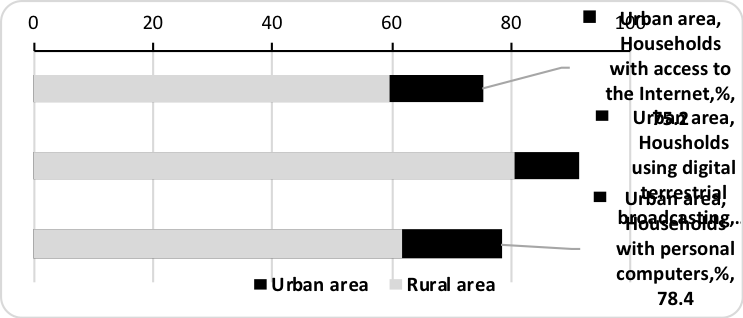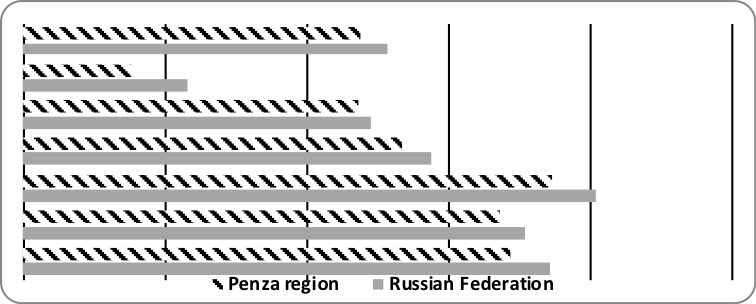Abstract
It is impossible to solve the main tasks of the state policy of Russia, outlined in the program “Digital Economy of the Russian Federation” to create the necessary conditions for the development of the digital economy, aimed at increasing the country's competitiveness, the quality of life of citizens, economic growth and national sovereignty, without a high level of the human capital development. The role of human capital in digital technologies is determined by the need for highly qualified specialists with new digital skills and abilities. In addition, digital technologies are actively involved in everyday life and require the active involvement of the entire population of the country, including the implementation of the current concept of e-government. Therefore, the priority direction of the state policy is to develop new guidelines for the human capital development in the digital economy. The article considers various approaches to the definition of the term “digital economy”, analyzes the development level of digital technologies in Russia, compares the development indicators of the digital economy of Russia and the countries - economic leaders, and determines the role of human capital in the development of the digital economy. The conclusion is made about the need to train personnel with a new type of thinking, intellectualization of the Russian population, aimed at the effective growth of human capital, as the main resource developing the digital economy.
Keywords: Digital economyhuman capitalinformationtechnologyeconomic activity
Introduction
Today the term “digital economy is confidently entering our life, although it is a relatively new phenomenon”. According to Bukh & Heeks (2017), “the digital economy” is that part of the economy that is represented by companies operating primarily with digital technologies and whose business model is based on digital products or services, consists of a digital sector in total with promising digital and platform services. At the same time, the term “digital economy”, introduced by computer scientist Nicholas Negroponte (Massachusetts University) back in 1995, does not have a clear definition. According to several scientists, this term means a mass use of telecommunications, the Internet, and mobile devices in the world. Thus, N. Lane defines the term “digital economy” as “... the convergence of computer and communication technologies on the Internet and the emerging flow of information and technologies that stimulate the development of electronic commerce and large-scale changes in the organizational structure” (Lane, 1999, p.317). E. Brynjolfsson and B. Kahin claim that the digital economy is not a complete transformation of all economic sectors yet due to digitalization of information using computer technology (Brynjolfsson & Kahin, 2000). T.L. Mesenbourg emphasizes that the term “digital economy” includes three components: e-business infrastructure that is part of the entire economic infrastructure used for electronic transactions and electronic commerce; e-business, which includes any operation that an enterprise carries out with the help of computer networks; electronic commerce, which refers to the volume of goods and services sold through computer networks (Mesenbourg, 2001). M. Knickrehm, B. Berthon and P. Daugherty adhere to the following approach to the definition of the term “digital economy” - this is part of the total production volume created by various “digital” resources, such as digital skills, digital equipment (components, software and communications) and intermediate digital goods and services used in production (Knickrehm, Bertho, & Daugherty, 2016). Deloitte Digital (formerly Alert Group) claims that the digital economy is a form of economic activity that arises from a billion examples of networking between people, businesses, devices, data and processes. The basis of the digital economy is hyper-connectivity, that is, the growing interconnectedness of people, organizations and machines, formed through the Internet, mobile technologies and the “Internet of Things”. Despite the different interpretations of the term, all scientists agree with one thing: the digital economy is based on digital technologies.
The development of digital technologies in recent decades has changed the way of life and the structure of many economic ties. It helps to expand the scope of application of intelligence and new digital skills on the labor market. First, it concerns ICT developers, engineers, specialists of various profiles, possessing advanced digital skills. For example, in the West, a forecast of the personnel capacity for digitization of various economic sectors is being made: according to the British government, by 2020 the number of graduates with digital and engineering skills is to be doubled (to 1.86 million). In addition, an investment of $ 2.5 billion will be required to train scientists, engineers and designers to get new qualifications. For Russia, this plan would include 4-6 million new specialists (The role of human capital in the formation of the digital economy, 2017). In addition, the level of digital skills is necessary not only for employment, but for everyday life, for example, for working with search engines and e-mail (special ICT skills of the population). Therefore, today an important direction is to develop new guidelines for the state policy in the sphere of the human capital development.
Problem Statement
The President of Russia, V. Putin, speaking at the meeting of the Council for Strategic Development and Priority Projects, noted that the digital economy is not a separate branch, but a way of life, a new basis for the development of public administration, the economy, the social sphere and the whole society. The problems of the development of the digital economy relate to ensuring the national security of the country, increasing the competitiveness of Russian companies, and creating and maintaining Russia's stable positions in the world arena in the long term. The program “Digital Economy of the Russian Federation” was adopted in July 28, 2017. The program notes the following: “People's daily life, production relations, economic structure and education are changing with the use of digital technologies... An increasing number of citizens ... recognize the need for digital competencies... The main objectives concerning personnel and education are: creating key conditions for training personnel of the digital economy; the improvement of the education system, which should provide the digital economy with competent personnel; the labor market, which must be based on demands of the digital economy; the creation of the incentive system to develop the necessary competencies and the participation of personnel in the development of the digital economy of Russia” (The program “Digital Economy of the Russian Federation”, 2017). In the framework of the program, key indicators for personnel and education in the field of the digital economy have been established by 2024. First, the number of graduates of universities in the field of ICT training should be at least 120 thousand people annually. Secondly, the share of graduates with secondary education and vocational secondary education with competences in the field of information technology should be at least 800 thousand people annually. Thirdly, the proportion of the population with digital skills should be at least 40% (The program “Digital Economy of the Russian Federation”, 2017).
Research Questions
The main research questions are:
Assessment of the development framework of the digital economy in Russia and foreign countries;
Analysis of human capital and human resources component of the Russian digital economy.
Purpose of the Study
The purpose of the study is:
Analyze the current state of information and communication technologies in Russia;
Reveal the level of readiness of the personnel component within the Russian digital economy.
Research Methods
Analysis of statistical data
According to the data presented at the meeting of the Council for Strategic Development and Priority Projects in 2017, the following figures were announced. In the period from 2010 to 2016 there was an increase in the proportion of households that had access to the Internet (from 48.4% to 74.8%). In 2016, in Russia, the average speed of the Internet grew by 29%, which is actually close to similar indicators of Italy and France. By early 2017, the data processing market and commercial storage centers in our country increased to 14.5 billion rubles. It is significant that Russia is at the level of the leading countries in terms of the dynamics of the spread of wireless networks and broadband Internet.
In terms of the development of the digital economy, Russia lags far behind the countries - economic leaders. So, experts of Digital McKinsey estimate that the share of the digital economy in the US GDP is 10.9%, China - 10%, Western European countries - 8.2%, India - 5.5%, Russia - 3, 9 %. According to the network readiness index, Russia is only on the 41st place in the world. At the same time, the potential of Russian digital platforms, according to the assessment of the Eurasian Economic Commission, is concentrated mainly in the field of ICT, electronic commerce, finance and services. In science, telemedicine and industry, there are no Russian digital platforms. There are currently recorded only three globally significant digital platforms in Russia, while China has 64, the USA have 63. This weakens the opportunities to expand the presence of Russia in global markets and hinders the processes of scientific and technological exchange as an indispensable condition for successful modernization of production facilities (Golova & Sukhovei, 2018).
Secondary analysis of data from all-Russian studies
According to the results of research conducted by the National Research University “Higher School of Economics” (Laikam et al., 2017), over the past years the use of information and telecommunication networks and information technologies in households has a positive dynamic (Figure

However, the indicators of informatization, use of the portal of public services in urban and rural areas differ significantly (Figures

Source: Laikam et al. (2017)

Source: Laikam et al. (2017)
Comparing the indicators of the use of Internet resources in general across Russia and in the Penza region, it should be noted that the Penza region, although insignificantly, lags behind the all-Russian indicators (Figure

It should be noted that there is a tendency to lag behind the use of Internet resources in rural areas in comparison with the urban ones. For example, 75.2% of urban households use broadband Internet and only 59.6% of households use it in rural areas; 26.5% of urban households and 12.9% of rural households make online purchases. An even greater gap is observed when assessing electronic public services. Thus, 55.7% of urban households use the Portal of Public Services, in rural areas this indicator is 36.4%.
Analysis of scientific publications on the subject matter under study
According to experts, by 2025 the digital economy will need about 5 million new personnel. From the point of view of T. A. Klyachko, E. A. Semionova, the main source of human capital is the sphere of education, since it is education that plays an important role in the formation of human capital, performing the function of training and vocational training of graduates of educational organizations, which, in turn, contribute to the economic and social development of the country (Klyachko & Semionova, 2018).
At the same time, as L.D. Gitelman, M.V. Kozhevnikov rightly noted, that we should emphasize the improvement of managerial education, which forms competences necessary for the implementation of a technological breakthrough in the country's economy. In order to solve complex problems of modernization and establishment of a new industry, decision-making under uncertainty, dynamic unpredictable changes and significant risks, managers need interdisciplinary competencies: engineering and management, engineering and economic and anticipatory actions (Gitelman & Kozhevnikov, 2018).
There is also an opposite point of view. As J. Kirton and B. Warren noted, digital technologies can have a destructive character that in the future will negatively affect productivity, employment and welfare... these technologies can also displace workers from the labor market and aggravate disparities in their level of availability and use, which will lead to a new digital divide and an increase in inequality (Kirton & Warren, 2018).
To date, according to Rosstat, only 33.5% of employees have higher education and 45.1% have vocational secondary education (Table
In addition, according to V.S. Bochko, the growth in the number of employed people who have higher education does not contribute to a proportional increase in the technological level of the economy due to changes in functions of higher education, which is gradually becoming an instrument for ensuring general cultural development of the population (Bochko, 2017).
To solve the state's tasks of creating high-tech and competitive high-tech enterprises in the global market by 2024, “industrial digital platforms for the main economic sectors”, including digital healthcare, digital education and the “smart” city, universities must train specialists in the field of IT. Consequently, there is additional investment in education. If in 2017 education was allocated 549 billion rubles (3.33% of the budget), then in 2018 this figure is 619.14 billion rubles (3.86%).
Findings
Human capital as the main value of the digital economy
The solution of the problems caused by the establishment of the digital economy in Russia is impossible without investments in the human capital development. As noted by R. Preston McAfee, vice president of Microsoft, “Human capital is 50% of the value in corporations. We think that the revolution concerns things, but in fact, it concerns people” (The role of human capital in the formation of the digital economy, 2017).
Training as a continuous process
The idea of continuing education, which became popular in the second half of the twentieth century, is today the main vector of the human capital development. “You cannot learn anything at school or university, and then do it all your life. It will be necessary to learn new skills, use new technologies. This will be a continuous process”, believes R. Preston McAfee (The role of human capital in the formation of the digital economy, 2017).
Highly qualified and highly intelligent specialists with digital skills and a new type of thinking
According to experts, it is not enough just to have professional skills. The digital economy needs personnel with the so-called skills of the 21st century and a new type of thinking. An important task is to enhance the intellectual capacity of human capital. In order for the digital economy of Russia to become competitive, the total intellectualization of the Russian population is needed, aimed at the effective growth of human capital, as the main resource developing the digital economy.
Conclusion
Today the term “digital economy” confidently enters our labor and everyday life, changing the way of life and the structure of economic ties. The term “digital economy” does not have a clear definition, and most foreign and Russian researchers agree that the basis of the digital economy is digital technologies, digital products and services. The role of human capital in digital technologies is very great, both in the field of employment expanding the application of intelligence, the formation and use of new digital skills, and in the daily lives of our citizens. That is why the priority trend of the state policy in the field of the digital economy is to develop new benchmarks in the sphere of the human capital development.
The main priority development trends of the digital economy in Russia are indicated in the state program “Digital Economy of the Russian Federation”. It establishes the main goals in the field of personnel and education, including, first, the improvement of the education system, the formation of conditions for the training of personnel in the field of the digital economy; secondly, the labor market takes into account the requirements of the digital economy, the participation of highly qualified specialists in the development of the digital economy of Russia.
Based on this, the purpose of the study is to analyze the current state of information and communication technologies in Russia and to identify the level of readiness of the human resources component within the Russian digital economy. It is possible to achieve this purpose by using a set of methods: analysis of Russian regulations on the digital economy, analysis of statistical data, analysis of media and scientific publications, secondary analysis of data from all-Russian studies.
According to the official data, Russia is roughly comparable with other leading countries in the dynamics of the distribution of wireless networks and the Internet; there is an increase in the speed of the Internet, and the number of households with access to the Internet, as well as the growth of the Russian market of commercial data storage and processing centers. The same results are confirmed by the results of the study carried out by the Higher School of Economics: the positive dynamics of ICT using telecommunication networks in households. However, there are significant differences in urban and rural areas, for example, in terms of informatization, the use of the Portal of Public Services. Comparative analysis of the use of Internet resources in general across Russia and in the Penza region shows that, although insignificantly, the Penza region lags behind all-Russian indicators.
Today we face legitimate questions. Is society ready to implement technologies in the digital economy? Does Russia have sufficient human capital for this? The main source of human capital is the sphere of education. According to today's data, 4-6 million new specialists are required to be trained in Russia: ICT developers, engineers, specialists of various profiles, with advanced digital skills. The planned indicators established in the digital economy of the Russian Federation in the field of personnel for the digital economy (by 2024) are the following: 120,000 graduates per year in higher education institutions and 800,000 people with secondary education and vocational secondary education in the areas of training related to ICT; 40% of Russians with digital skills. As a consequence, we need additional investment in education.
References
- Bochko, V. S. (2017). Intellectual and technological development of regions: challenges and ways to overcome them. Economy of the Region, 13 (4), 1055-1067. https://dx.doi.org/10.17059 / 2017-4-7
- Brynjolfsson, E., & Kahin, B. (2000). Introduction in understanding the digital economy. Cambridge: MIT Press.
- Bukh, R., & Heeks, R. (2017). Defining, conceptualising and measuring the digital economy. Global Development Institute Working Papers, 4, 68-72.
- Gitelman, L.D., & Kozhevnikov, M.V. (2018). Paradigm of management education for technological breakthrough in the economy. Economy of the Region, 14 (2), 433-449. https://dx.doi.org/10.17059 / 2018-2-8
- Golova, I.M., & Sukhovei, A.F. (2018). Challenges of innovative security of the regional development in the conditions of digital society. Economy of the Region, 14 (3), 987-1002. https://dx.doi.org/10.17059 / 2018-3-21
- Kirton, J.J., & Warren, B. (2018). G 20 Governance of digitalization. International Organisations Research Journal, 13 (2). 16–41.
- Klyachko, T.A., & Semionova, E. A. (2018). The contribution of education to the socio-economic development of Russian regions. Economy of the Region, 14 (3). 791-805. https://dx.doi.org/10.17059 / 2018-3-8
- Knickrehm, M., Bertho, B., & Daugherty, P. (2016). Digital disruption: the growth multiplier. Dublin: Accenture.
- Laikam, K. E., Abrakhmanova, G. I., Gojhnerg, L. M., & Dudorova, O. Yu. (2017). Information Society in the Russian Federation: Statistical Collection. Moscow: NIU HSE.
- Lane, N. (1999). Advancing the digital economy into the 21st century. Information Systems Frontiers, 1 (3), 317-320.
- Mesenbourg, T.L. (2001). Measuring the digital economy, US Bureau of the Census. Suitland: MD.
- The program “Digital Economy of the Russian Federation” (2017). Mandated by the Order of the Government of the Russian Federation of 28.07.2017 № 1632-r. URL: http://static.government.ru/media/files/9gFM4FHj4PsB79I5v7yLVuPgu4bvR7M0.pdf
- The role of human capital in the formation of the digital economy (2017). TASS. URL: https://tass.ru/pmef-2017/articles/4309767 Accessed: September 23, 2018.
- The role of human capital in the formation of the digital economy (2017). TASS. URL: https://news.rambler.ru/scitech/37004047/?utm_content=rnews&utm_medium=read_more&utm_source=copylink Accessed: September 22, 2018.
Copyright information

This work is licensed under a Creative Commons Attribution-NonCommercial-NoDerivatives 4.0 International License.
About this article
Publication Date
20 March 2019
Article Doi
eBook ISBN
978-1-80296-056-3
Publisher
Future Academy
Volume
57
Print ISBN (optional)
-
Edition Number
1st Edition
Pages
1-1887
Subjects
Business, business ethics, social responsibility, innovation, ethical issues, scientific developments, technological developments
Cite this article as:
Tuguskina, G., Rozhkova, L., Taktarova, S., & Salnikova, O. (2019). The Role Of Human Capital In The Digital Economy. In V. Mantulenko (Ed.), Global Challenges and Prospects of the Modern Economic Development, vol 57. European Proceedings of Social and Behavioural Sciences (pp. 960-968). Future Academy. https://doi.org/10.15405/epsbs.2019.03.95

